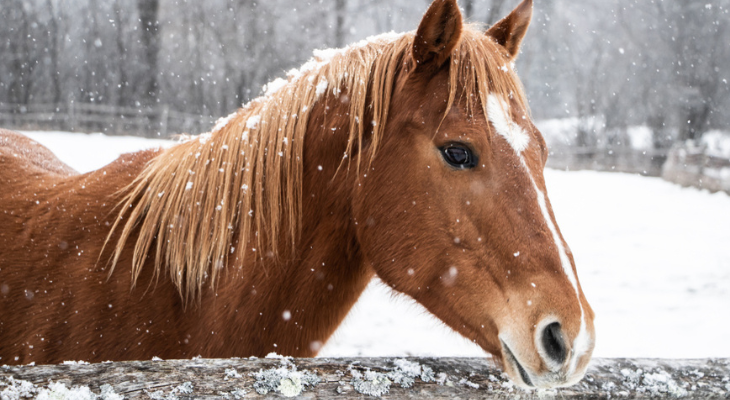
How to Care for Your Horses This Winter
Are your horses ready for winter? Although you won't need to make drastic changes to your normal routine, equines do require extra care and attention during the coldest months of the year. As winter approaches, keep these horse care recommendations in mind.
Repair Stables and Shelters
Although a small hole in a wall, roof, or foundation may not seem like a major problem, even small gaps allow wind, sleet, snow, and rain to seep into your barn. In addition to chilling indoor spaces, snow or sleet increases moisture, creating the perfect environment for mold growth. Mold decreases nutrients in hay and can cause respiratory problems, according to the University of Wisconsin Extension.
Don't forget about outdoor shelters and lean-tos. Make sure roofs and walls are structurally sound and free of holes and gaps.
Keep Your Horse Warm
Many horses are perfectly happy to spend time outdoors when snowflakes fall and the wind blows, thanks to their thick winter coats. So how cold is too cold? The University of Minnesota Extension advises that temperatures between 18 and 59F are best for horses. A horse in good condition with a thick coat may be perfectly comfortable when it's 18 degrees outside, while an old or sick horse with a clipped coat could feel cold when the temperature drops to 50 degrees.
Blankets offer a simple way to maintain warmth and improve comfort on cold days. If a horse is healthy and has a thick coat, a blanket may not be necessary in some cases. The University of Minnesota Extension recommends using blankets if your horse:
- Is Clipped
- Will Be Outdoors in the Rain or Freezing Rain
- Is In Poor Condition
- Is Old or Young
- Isn't Used to Cold Temperatures
When you're in a hurry, it's easy to forget to swap your horse's stable blanket for a turnout blanket. Since stable blankets aren't waterproof like turnout blankets, your horse could become chilled if snow or sweat drenches the blanket. If a blanket does become wet, wait until your horse's coat dries completely before putting a dry blanket on its back.
Increase Forage Amounts
In addition to providing nutrients needed for good health, forage also helps your horses stay warm. Digestion generates heat that makes cold temperatures much more tolerable. Horses should eat 1.5 - 3% percentage of their body weight in forage during the winter, according to Rutgers, the State University of New Jersey.
Make It Easy For Your Horse to Drink Water
Drinking ice-cold water on a frigid day isn't any more appealing to your horses than it is to you. Unfortunately, if a horse doesn't drink enough water, it may not eat enough or might even face a bout of painful colic. In fact, lack of fresh water is the primary reason horses develop colic in the winter, according to the American Association of Equine Practitioners. Breaking up ice on outdoor troughs and using heaters to warm water in buckets and troughs will encourage your horses to drink more.
The warmer the temperature of water, the more likely your horse will be to drink. In a pivotal study on water temperatures conducted by University of Pennsylvania researchers, ponies offered 66F water drank 40% more water than a control group provided with 32 - 38F water. Use a thermometer to check heated water periodically, as older heaters can break down or become less efficient.
Prioritize Hoof Care
Add a daily hoof check to your winter horse care checklist. Removing snow and ice from the hooves and around the shoes makes walking easier and reduces the risks of falls.
Don't Forget About Exercise
Regular exercise is necessary for strong muscles, a healthy heart, and flexible limbs, no matter what the age of your horse. Although it's not a good idea to turn out your horse during extreme weather conditions, most horses benefit from spending part of the day outdoors during the winter. Slipping on wet snow or icy surfaces is certainly a possibility during cold winter days. Before winter weather arrives, ask your farrier or veterinarian to check your horse's shoes and recommend changes if poor grip is a problem.
Do you have a concern about your horse's winter weather readiness? Contact our office to discuss your concerns or make an appointment with the equine veterinarian.
Sources:
University of Wisconsin Extension: Moldy Hay for Horses
https://fyi.extension.wisc.edu/forage/moldy-hay-for-horses/
University of Minnesota Extension: Caring for Your Horse in the Winter, 2022
Rutgers, State University of New Jersey: Winter Feeding for Horses, 2/2011
https://esc.rutgers.edu/fact_sheet/winter-feeding-for-horses/
Journal of Applied Animal Behaviour Science: Drinking Water Temperature Affects Consumption of Water During Cold Weather in Ponies, 5/9/1994

